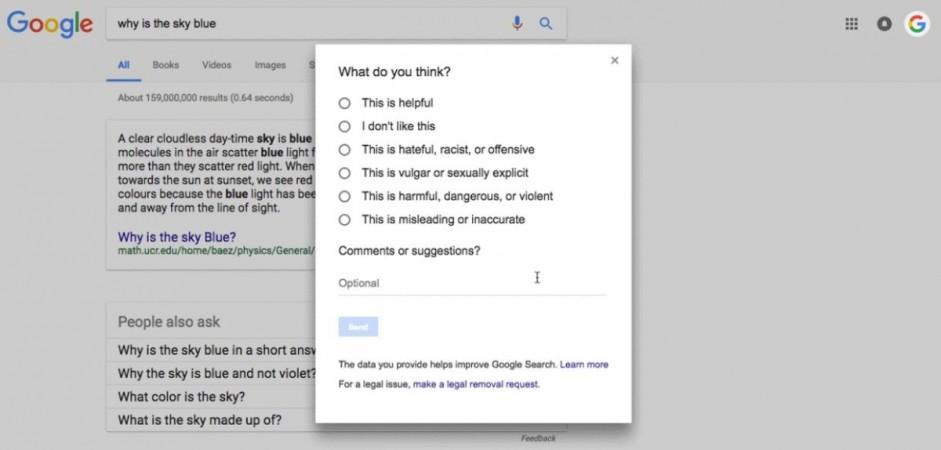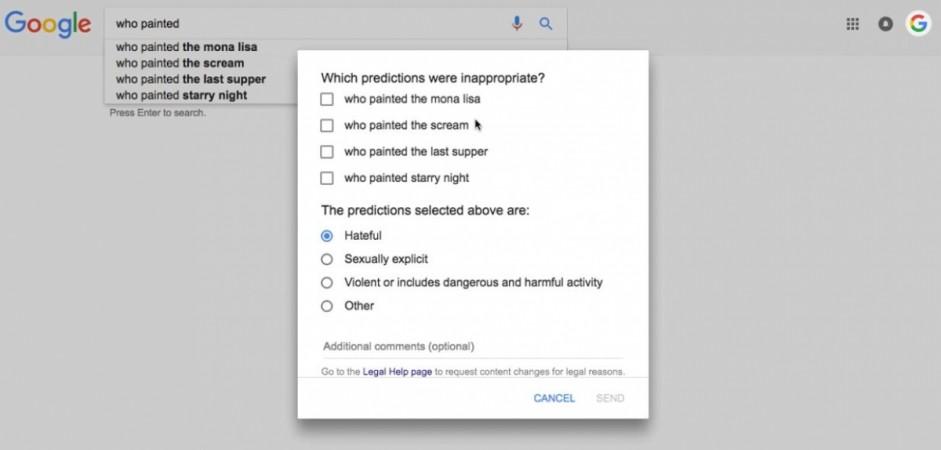![[Representational Image] Google tweaks its search engine algorithm to combat hate and fake news In Picture: Google logo Google search quality improvements, autocomplete, fake news, hate speech](https://data1.ibtimes.co.in/en/full/600514/women-india-more-active-google-search-men.jpg?w=649&h=449&l=50&t=40)
Google has commenced tweaking its search algorithm to curb unscrupulous circulation of fake news and hate speeches online.
With thousands of web-pages going live each day, it's hard for people and even the search engine companies to filter true facts from false reports, which harms a person's or community's credibility.
Also read: Google tweaks YouTube's Restricted Mode to allow LGBT-related videos; lays out guidelines for content creators
It has also come to light that some tech-savvy extremists with SEO (Search Engine Optimisation) techniques too have learned to trick the search algorithm.
To put an end to this growing 'fake news' epidemic, Google via Project Owl initiative, has made huge structural changes in its search algorithm and also introduced feedback system to rank the news and other infotainment websites.
"With that longer-term effort in mind, today we're taking the next step toward continuing to surface more high-quality content from the web. This includes improvements in Search ranking, easier ways for people to provide direct feedback, and greater transparency around how Search works," Ben Gomes, vice president, engineering, Google, said in a statement.
Hence forth, based on the ratings, contents will be accordingly listed on search results.
Here's brief description of changes being implemented by Google to end fake news circulation:
Google's New Search Ranking:
In a bid to curb circulation of fake news and inappropriate online, Google has enhanced its evaluation methods and made algorithmic updates to surface more authentic content using the following to methods.

- New Search Quality Rater guidelines: Google has set-up a group of real people to evaluate the quality of Google's search results—give direct feedback on our experiments. These ratings don't actually determine individual page rankings, but it's a process of just gathering data on the quality of search results on Google and identify particular areas where there needs to have improve. Last month, Google updated its Search Quality Rater Guidelines to provide more detailed examples of low-quality webpages for raters to appropriately flag, which can include misleading information, unexpected offensive results, hoaxes and unsupported conspiracy theories. Google has already started using these guidelines in its algorithms in demoting such low-quality content and plans to incorporate measures that are more stringent, in future.
- Ranking changes: Google has identified hundreds of subtle signals to determine which results they show for a given query—from the freshness of the content, to the number of times the users' search queries appear on the page. They have adjusted their signals to help surface more authoritative pages and demote low-quality content, so that issues similar to the Holocaust denial results that got reported back in December are less likely to appear.
Google's New Direct Feedback Tools:

Many would remember auto-generated Google search incident, which rocked the headlines in 2015, where-in India's Prime Minister, Narendra Modi images popped on top, when people typed 'Top ten criminals of the world". Well, Google has finally come up with a solution for that too.
With an aim to speed up the experience with features like Autocomplete, which helps predict the searches you might be typing to quickly get to the authentic info you need, and Featured Snippets, which shows a highlight of the information relevant to what you're looking for at the top of your search results.
Initially, the content that appears in these features was generated algorithmically and is a reflection of what people are searching for and what's available on the web and that actually caused the aforementioned incident.
Starting April 25, Google has made it much easier for people to directly flag content that appears in both Autocomplete predictions and Featured Snippets.
These new feedback mechanisms include clearly labeled categories so that users can inform Google directly if they find it sensitive or unhelpful content. The company plans to use this feedback to help improve their algorithms.
Watch this space for latest news on Google products.














